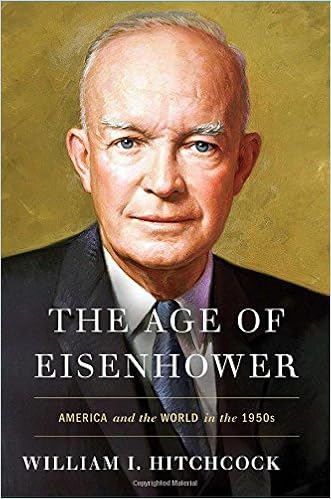Historian William Hitchcock shoots straight. Direct. And his news is factual truth. Witness an expert from his USA Today op-ed, published February 12.
“The last Army general to occupy the White House, Dwight D. Eisenhower, would be spinning in his grave if he knew that President Trump, a man who used a medical deferment to avoid combat service in Vietnam, was planning a giant military parade in Washington.”
The op-ed was a well-written reminder that The Age of Eisenhower: America and the World in the 1950s (Simon & Schuster, $35) was being released; Hitchcock’s massive tome is not only an absorbing, serious biography at its best, but it could (if needed) serve as a murder weapon.

Since I grew up long after the I LIKE IKE movement was around, I never had a chance to understand what the fuss was about. Now I do.
In a 2017 survey, presidential historians ranked Dwight D. Eisenhower fifth on the list of great presidents, behind the perennial top four: Lincoln, Washington, Franklin D. Roosevelt and Teddy Roosevelt. Hitchcock shows that this high ranking is justified. Eisenhower’s accomplishments were enormous and loom ever larger from the vantage point of our own tumultuous times. A former general, Ike kept the peace: He ended the Korean War, avoided a war in Vietnam, adroitly managed a potential confrontation with China, and soothed relations with the Soviet Union after Stalin’s death.
He guided the Republican Party to embrace central aspects of the New Deal like Social Security. He thwarted the demagoguery of McCarthy, and he advanced the agenda of civil rights for African Americans. As part of his strategy to wage and win the Cold War, Eisenhower expanded American military power, built a fearsome nuclear arsenal and launched the space race.
In his famous Farewell Address, he acknowledged that Americans needed such weapons in order to keep global peace, but he also admonished his citizens to remain alert to the potentially harmful influence of the “military-industrial complex”.
From 1953 to 1961, no one dominated the world stage as did President Dwight D. Eisenhower. The Age of Eisenhower is the definitive account of this presidency, drawing extensively on declassified material from the Eisenhower Library, the CIA, and the Defense Department and troves of unpublished documents. In his masterful account, Hitchcock shows how Ike shaped modern America, and he astutely assesses Eisenhower’s close confidants, from Attorney General Brownell to Secretary of State Dulles.
The result is an eye-opening reevaluation that explains why this “do-nothing” president is rightly regarded as one of the best leaders our country has ever had.
